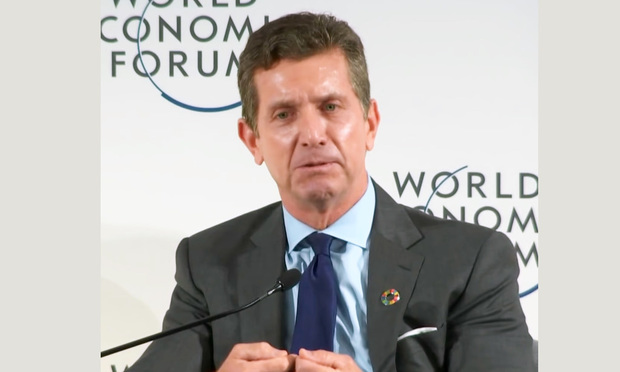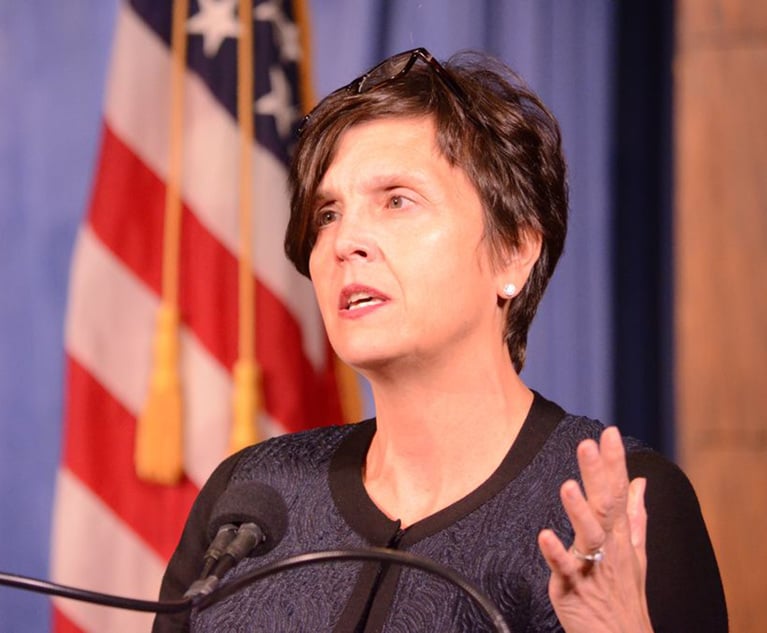In 2nd Congressional Hearing Over Cosmetic Talc's Safety, J&J Is a No-Show
Johnson & Johnson, disputing the FDA's testing that found asbestos in a lot of its baby powder, said its CEO was not the appropriate person to testify at the hearing and that the committee's Democratic members rejected its alternatives.
December 10, 2019 at 06:56 PM
6 minute read
 Johnson & Johnson CEO Alex Gorsky. (Photo: Wikimedia)
Johnson & Johnson CEO Alex Gorsky. (Photo: Wikimedia)
Three doctors and a man diagnosed with mesothelioma testified on Tuesday in the second Congressional hearing over the safety of cosmetic talcum powder products, but it was the person who did not show up who got the most attention.
Raja Krishnamoorthi, D-Illinois, chairman of the U.S. House Committee on Oversight and Reform's Subcommittee on Economic and Consumer Policy, opened the hearing by stating he was "disappointed" that Johnson & Johnson CEO Alex Gorsky refused to appear.
"While Mr. Gorsky has not refrained from making multiple public statements on this topic, including authoring written statements and speaking with media outlets, he has now avoided voluntarily testifying under oath before Congress," he said.
Subcommittee member Ayanna Pressley, D-Massachusetts, had a more pointed statement: "Mr. Gorsky, I hope you're watching today, because we still want answers."
Republican members of the subcommittee said their Democratic colleagues rejected Johnson & Johnson's proposal to have an alternative executive testify and questioned the overall fairness of the hearing, given that the witnesses were experts for plaintiffs in talcum powder trials across the country.
As a result, the hearing "may result in the perception that the committee's investigation is not about learning new facts about the potential harm of consumer products but rather is about trying to publicly shame or embarrass a company and seek out 'gotcha' moments to aid in ongoing litigation—something this committee has been regularly doing in the past year," said subcommittee member James Comer, R-Kentucky. "I worry, too, that the committee's actions raise questions about whether it's using its investigative tools to interfere with, or give the appearance of interfering with, ongoing litigation."
Johnson & Johnson issued a lengthy statement that referenced a Dec. 2 letter by its lawyer, Brian Smith, a partner at Covington & Burling in Washington, D.C., offering its own expert or another executive to testify.
"Unfortunately, the one-sided format of today's hearing was indistinguishable from what has already been propagated by plaintiff lawyers in the ongoing litigation," the statement said. "We had hoped to contribute to a balanced and meaningful discussion about such a highly specialized topic, yet after ongoing conversations with the subcommittee, it rejected hearing from our technical expert who holds multiple degrees in geology and has decades of experience testing for asbestos. It also refused to hear from our company group chairwoman responsible for the North American Consumer Health business. We repeatedly informed the Subcommittee that our CEO is not an expert in the hearing topic, and we respectfully declined the invitation for our CEO to testify."
The hearing is the second before Congress over cosmetic talcum powder's safety. In March, the same subcommittee held the first hearing after the U.S. Food and Drug Administration warned consumers that four cosmetic products from retailers Claire's and Justice contained asbestos, a known carcinogen linked to mesothelioma. The Department of Justice and the U.S. Securities and Exchange Commission also had issued subpoenas in an investigation of asbestos in Johnson & Johnson's baby powder.
At the time, Johnson & Johnson criticized the hearing as "biased with a majority of witnesses being connected to litigation against our company."
The focus of the first hearing, which featured a plaintiffs expert and the son of a woman whose widow won a $72 million verdict in 2016, was cosmetic talc's connection to ovarian cancer.
On Tuesday, the subcommittee asked about another cancer, mesothelioma, after the FDA, on Oct. 18, found a type of asbestos in a sample of one lot of Johnson & Johnson's baby powder. Johnson & Johnson recalled that lot—about 33,000 bottles of its baby powder—the same day and later brought in two separate laboratories to conduct multiple tests of the same bottles the FDA used. Those tests found no asbestos, although one lab initially discovered asbestos in one of its findings, which Johnson & Johnson attributed to contamination from a portable air conditioner.
Additional testing found no asbestos, prompting Johnson & Johnson to conclude earlier this month that the "most probable root causes for the FDA's reported results were either test sample contamination and/or analyst error" at the lab.
The discrepancies raised questions about various testing methods—the focus of Tuesday's hearing, titled "Examining Carcinogens in Talc and the Best Methods for Asbestos Detection." The witnesses were William Longo, founder of Materials Analytical Services; Jacqueline Moline, a physician at the Feinstein Institute of Medical Research at Northwell Health; and Dr. Rod Metcalf, an associate professor of geology at the University of Nevada in Las Vegas. Johnson & Johnson challenged the scientific findings of both Longo and Moline in a 2018 talcum powder trial in which a man diagnosed with mesothelioma got a $117 million verdict.
Longo and Moline both told the subcommittee on Tuesday that their research found asbestos in talcum powder.
"Independent labs throughout the country and over the course of several decades have documented the presence of asbestos in consumer talc products, including Johnson & Johnson's baby powder," Longo said. "The methods used in the past and today by the industry are not sensitive enough to detect trace levels of asbestos."
Subcommittee member Carol Miller, R-West Virginia, questioned Longo's research, noting that in the early 2000s he testified that asbestos in talc was an "urban legend."
Longo said that was before getting access to thousands of internal documents at Johnson & Johnson and using a "much more sensitive method" of testing.
Glenn Grothman, R-Wisconsin, another subcommittee member, asked Longo how much he made being an expert at trials, insisting reports of as much as $30 million. Longo replied that he made between $1 million and $1.5 million in the past three years.
The fourth witness was David Etheridge, one of four plaintiffs who won a $37.3 million verdict in New Jersey on Sept. 11 against Johnson & Johnson.
A Presbyterian minister from Virginia, Etheridge was diagnosed with mesothelioma at age 56.
"Baby powder containing talc was the source of my asbestos exposure and the cause of the cancer that will kill me," he said. "At the very least, we should regulate the use of talc or add warning labels to the products, but, ideally, we need to get this stuff off the shelves."
Krishnamoorthi, who sent a letter to Gorsky asking for more documents by Dec. 24 on the testing of Johnson & Johnson's baby powder, vowed there would be yet another congressional hearing on the safety of cosmetic talc and said he hoped Johnson & Johnson would participate in the future.
"Too many people are demanding too many answers to important questions, and the safety of Johnson & Johnson's talcum powder cosmetic products is now in serious doubt," he said.
This content has been archived. It is available through our partners, LexisNexis® and Bloomberg Law.
To view this content, please continue to their sites.
Not a Lexis Subscriber?
Subscribe Now
Not a Bloomberg Law Subscriber?
Subscribe Now
NOT FOR REPRINT
© 2025 ALM Global, LLC, All Rights Reserved. Request academic re-use from www.copyright.com. All other uses, submit a request to [email protected]. For more information visit Asset & Logo Licensing.
You Might Like
View All
Skadden and Steptoe, Defending Amex GBT, Blasts Biden DOJ's Antitrust Lawsuit Over Merger Proposal
4 minute read
'Lack of Independence' or 'Tethered to the Law'? Witnesses Speak on Bondi
4 minute read
Trending Stories
- 1Paul Hastings, Recruiting From Davis Polk, Continues Finance Practice Build
- 2Chancery: Common Stock Worthless in 'Jacobson v. Akademos' and Transaction Was Entirely Fair
- 3'We Neither Like Nor Dislike the Fifth Circuit'
- 4Local Boutique Expands Significantly, Hiring Litigator Who Won $63M Verdict Against City of Miami Commissioner
- 5Senior Associates' Billing Rates See The Biggest Jump
Who Got The Work
J. Brugh Lower of Gibbons has entered an appearance for industrial equipment supplier Devco Corporation in a pending trademark infringement lawsuit. The suit, accusing the defendant of selling knock-off Graco products, was filed Dec. 18 in New Jersey District Court by Rivkin Radler on behalf of Graco Inc. and Graco Minnesota. The case, assigned to U.S. District Judge Zahid N. Quraishi, is 3:24-cv-11294, Graco Inc. et al v. Devco Corporation.
Who Got The Work
Rebecca Maller-Stein and Kent A. Yalowitz of Arnold & Porter Kaye Scholer have entered their appearances for Hanaco Venture Capital and its executives, Lior Prosor and David Frankel, in a pending securities lawsuit. The action, filed on Dec. 24 in New York Southern District Court by Zell, Aron & Co. on behalf of Goldeneye Advisors, accuses the defendants of negligently and fraudulently managing the plaintiff's $1 million investment. The case, assigned to U.S. District Judge Vernon S. Broderick, is 1:24-cv-09918, Goldeneye Advisors, LLC v. Hanaco Venture Capital, Ltd. et al.
Who Got The Work
Attorneys from A&O Shearman has stepped in as defense counsel for Toronto-Dominion Bank and other defendants in a pending securities class action. The suit, filed Dec. 11 in New York Southern District Court by Bleichmar Fonti & Auld, accuses the defendants of concealing the bank's 'pervasive' deficiencies in regards to its compliance with the Bank Secrecy Act and the quality of its anti-money laundering controls. The case, assigned to U.S. District Judge Arun Subramanian, is 1:24-cv-09445, Gonzalez v. The Toronto-Dominion Bank et al.
Who Got The Work
Crown Castle International, a Pennsylvania company providing shared communications infrastructure, has turned to Luke D. Wolf of Gordon Rees Scully Mansukhani to fend off a pending breach-of-contract lawsuit. The court action, filed Nov. 25 in Michigan Eastern District Court by Hooper Hathaway PC on behalf of The Town Residences LLC, accuses Crown Castle of failing to transfer approximately $30,000 in utility payments from T-Mobile in breach of a roof-top lease and assignment agreement. The case, assigned to U.S. District Judge Susan K. Declercq, is 2:24-cv-13131, The Town Residences LLC v. T-Mobile US, Inc. et al.
Who Got The Work
Wilfred P. Coronato and Daniel M. Schwartz of McCarter & English have stepped in as defense counsel to Electrolux Home Products Inc. in a pending product liability lawsuit. The court action, filed Nov. 26 in New York Eastern District Court by Poulos Lopiccolo PC and Nagel Rice LLP on behalf of David Stern, alleges that the defendant's refrigerators’ drawers and shelving repeatedly break and fall apart within months after purchase. The case, assigned to U.S. District Judge Joan M. Azrack, is 2:24-cv-08204, Stern v. Electrolux Home Products, Inc.











